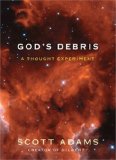 God’s Debris: A Thought Experiment, by Scott Adams
God’s Debris: A Thought Experiment, by Scott Adams
Andrews McMeel Publishing, 07407219089, 2001, 132 pp.
This is one of those books that attempts to make you think and to bring up ideas and ways of thought through the medium of a carefully crafted novel. It reminds me of such books as Illusions by Robert Bach or The Way of the Peaceful Warrior by Dan Millman which also lay down their ideas through the medium of a novel rather than directly addressing them in a traditional manner.
This could be reminiscent of the works of Plato where he would put forth his philosophical arguments in the form of dialogues usually cantered around Socrates.
The problem I have with this attempt is that it never really flows. In many ways it is too specific and too crafted, you can feel the narrative dragging you along in the direction the author wants your thoughts to go and there is no real room for variance. The beauty of a book like Illusions was that there was never any real direct reference to the ideas the Author was trying to get across, they were subtly buried in the ideas of the storyline and you came to the conclusions yourself, almost without realising it. Not as solid fact but just as a kind of new information and way of thinking that you didn’t posses before, it makes sense in it’s own context.
I found God’s Debris to be somewhat disjointed. There were many excellent ideas in the book, things that made sense in their own way, however they didn’t all seem to gel naturally together, it felt like Adams had taken all his ponderings and ideas and various possibilities and then attempted to sew them all together into one seamless story that is intended to leave you sat at the end thinking that yes, I guess it really could be like that, and the challenge is, as the book challenges on the cover, to try and work out why it couldn’t work. The trouble is that many of the arguments in the book are flawed and based on very large assumptions that you feel the narrative should challenge but never does. The whole story revolves around two individuals; the wise old man who we suppose knows everything and the naive yet potential young man whom he decides to impart his wisdom upon. The young man never really challenges anything he is told, he offers up occasional loose or obvious resistance but is quick to accept whatever explanation he is given and then accept that what he was just told must of course be true and make sense. The story, as it progresses, builds each new idea on the conclusion of previous ideas which are in turn based on previous ones, all reached via large assumption and little challenge or development, so as it progresses it becomes less and less cohesive and you are left thinking, well I guess you could say that but it kinda contradicts what you said earlier and if that’s true then how can so and so be true as well etc.
So, if the intention of the book was to throw up interesting questions in their own right then certainly it succeeds, there is plenty in this book to think about. The mistake, I think, was to present it in such a way that all the ideas are forced to fit together to make one larger more grandiose idea that doesn’t quite make it. If you are looking for a book that you can read through and then sit back at the end and go, wow, then Richard Bach’s Illusions is more suited, but if you want a book that actually brings up specific ideas and gives you many different things to think about then this book might be what you are looking for.








